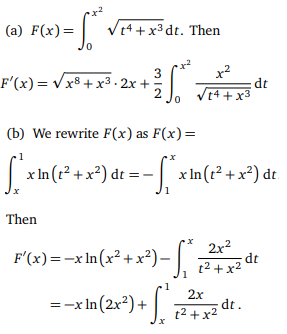With G(u, x) defined as above we have
F(x) = G(f (x), x)
and we can find the derivative of F using the chain rule
F'(x) = Gu(f (x), x)f'(x) + Gx (f (x), x)
We know from the problem statement, that

and what we need know is the derivative Gu (u, x). But this we obtain from the fundamental theorem of calculus, which states that

or in our notation, Gu (u, x) = g(u, x). It means that differentiating an integral with respect to the upper limit results in the function we are integrating. Putting it all together we obtain

Now we are ready to attempt the problems
